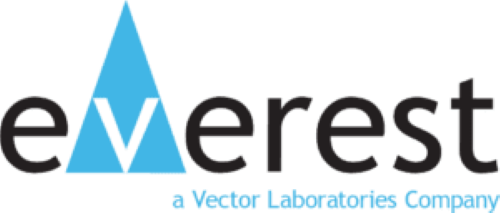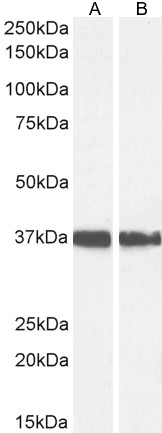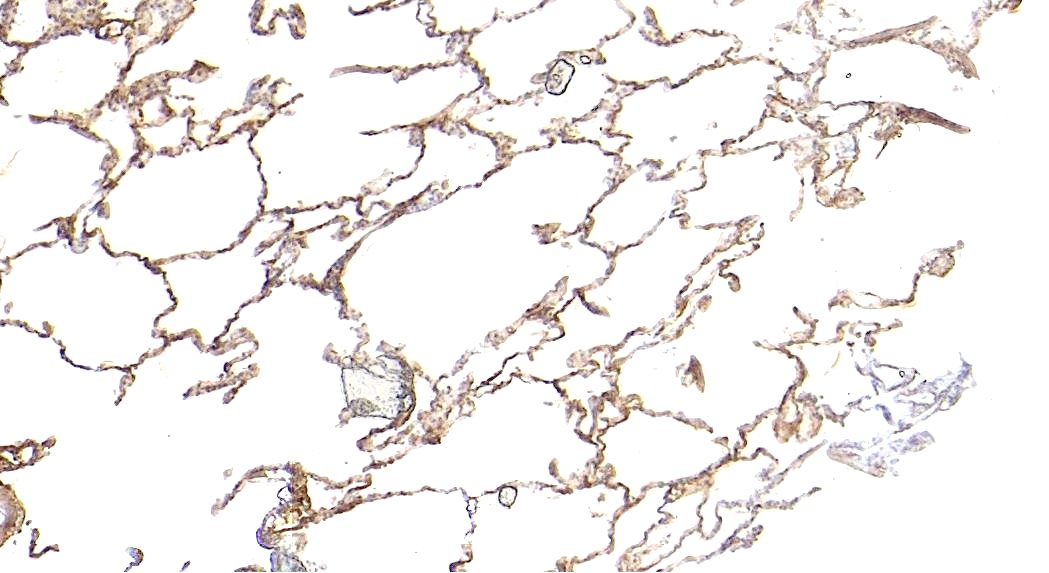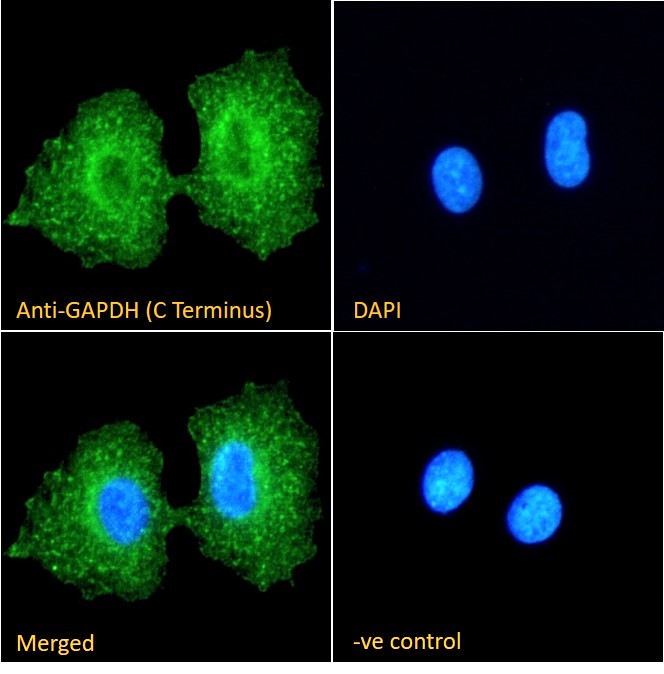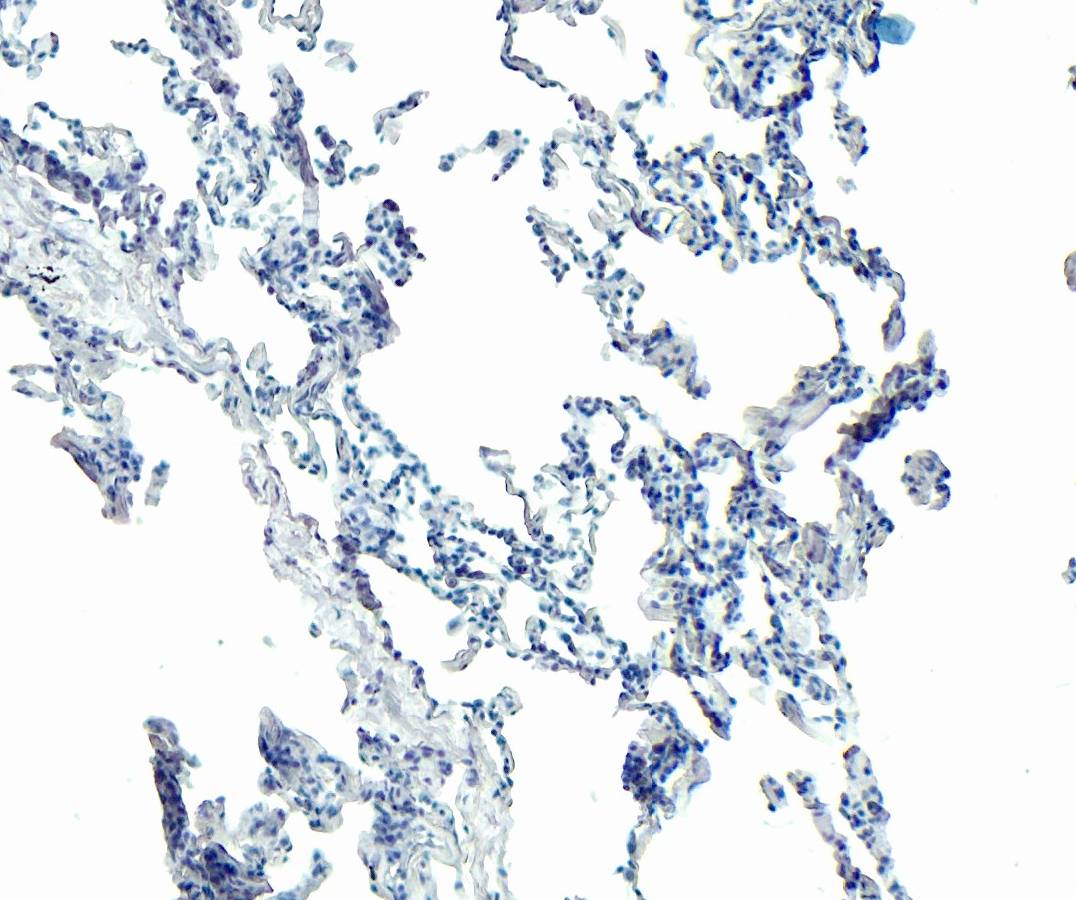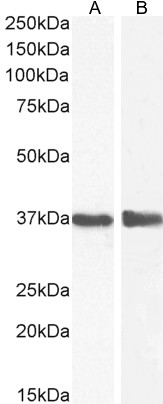Formulation Supplied at 0.5 mg/ml in Tris saline, 0.02% sodium azide, pH7.3 with 0.5% bovine serum albumin.
| |
Unit Size 100 µg | |
Storage Instructions Aliquot and store at -20°C. Minimize freezing and thawing. | |
Synonym / Alias Names peptidyl-cysteine S-nitrosylase GAPDH|HEL-S-162eP|epididymis secretory sperm binding protein Li 162eP|glyceraldehyde 3-phosphate dehydrogenase|aging-associated gene 9 protein|MGC88685|GAPD|G3PD|HGNC:4141|glyceraldehyde-3-phosphate dehydrogenase|GAPDH | |
Usage Summary Immunofluorescence: Strong expression of the protein seen in the cytoplasm, membranes and cytoplasmic bodies of A549 cells. Recommended concentration: 10µg/ml. | |
Accession ID NP_002037.2 | |
Blocking Peptide EBP06377 | |
Immunogen Peptide with sequence C-HQVVSSDFNSDT, from the C Terminus of the protein sequence according to NP_002037.2. | |
Product Comments GAPDH is constitutively expressed in almost all tissues at high levels. It is therefore a useful marker when a loading/positive control is required in western blotting. | |
Peptide Sequence C-HQVVSSDFNSDT | |
Purification Method Purified from goat serum by ammonium sulphate precipitation followed by antigen affinity chromatography using the immunizing peptide. | |
Shipping Instructions Refrigerated | |
Predicted Species Human, Mouse, Dog, Pig | |
Reactive Species Human, Mouse | |
Human Gene ID 2597 | |
Product Grade  | |
IHC Results Paraffin embedded Human Lung. Recommended concentration: 5-6µg/ml. | |
ELISA Detection Limit Antibody detection limit dilution 1:4000. | |
Western Blot Approx. 37kDa band observed in lysates of cell lines HEK293 and HeLa, and in Human Liver and Mouse Spleen lysates (calculated MW of 36.1kDa according to Human NP_002037.2, and 35.8kDa according to Mouse NP_032110.1). Recommended concentration: 0.1-1µg/ml. Primary incubation 1 hour at room temperature. | |
Application Type Pep-ELISA, WB, IF, IHC |
Goat Anti-GAPDH (C Terminus) Loading Control Antibody
$431.00
| SKU | Unit Size | Price |
|---|---|---|
Select a unit size:
Selected References [{"pmid": 30032029, "intro": "This antibody (previous batch) has been successfully used in Western blot on Human and Mouse:", "title": "MXB inhibits murine cytomegalovirus", "author": "Jaguva Vasudevan AA, Bähr A, Grothmann R, Singer A, Häussinger D, Zimmermann A, Münk C.", "journal": "Virology. 2018 Sep;522:158-167."}, {"pmid": 27570965, "intro": "This antibody (previous batch) has been successfully used in Western blot on Drosophila:", "title": "Practical Recommendations for the Use of the GeneSwitch Gal4 System to Knock-Down Genes in Drosophila melanogaster.", "author": "Scialo F, Sriram A, Stefanatos R, Sanz A.", "journal": "PLoS One. 2016 Aug 29;11(8)"}, {"pmid": 24526161, "intro": "This antibody (previous batch) has been successfully used in Western blot on Human:", "title": "Interferon-? induces loss of spherogenicity and overcomes therapy resistance of glioblastoma stem cells.", "author": "Happold C, Roth P, Silginer M, Florea AM, Lamszus K, Frei K, Deenen R, Reifenberger G, Weller M.", "journal": "Mol Cancer Ther. 2014 Apr;13(4):948-61."}, {"pmid": 30233553, "intro": "This antibody (previous batch) has been successfully used in Western blot on Human:", "title": "APOBEC3B Activity Is Prevalent in Urothelial Carcinoma Cells and Only Slightly Affected by LINE-1 Expression", "author": "Ananda Ayyappan Jaguva Vasudevan, Ulrike Kreimer, Wolfgang A Schulz, Aikaterini Krikoni, Gerald G Schumann, Dieter Häussinger, Carsten Münk, Wolfgang Goering", "journal": "Front Microbiol. 2018 Sep 4;9:2088."}, {"pmid": 22564186, "intro": "This antibody (previous batch) has been successfully used in Western blot on Human:", "title": "Distinct molecular mechanisms of acquired resistance to temozolomide in glioblastoma cells.", "author": "Happold C, Roth P, Wick W, Schmidt N, Florea AM, Silginer M, Reifenberger G, Weller M.", "journal": "J Neurochem. 2012 May 7. doi: 10.1111/j.1471-4159.2012.07781.x."}, {"pmid": 31292108, "intro": "This antibody (previous batch) has been successfully used in Western blot on Drosophila:", "title": "Minimal effects of spargel (PGC-1?) overexpression in a Drosophila mitochondrial disease model", "author": "Jack George & Howard T. Jacobs", "journal": "bioRxiv 529545; doi: https://doi.org/10.1101/529545 (2019)"}, {"pmid": 30068654, "intro": "This antibody (previous batch) has been successfully used in Western blot on Human:", "title": "USP18 (UBP43) Abrogates p21-Mediated Inhibition of HIV-1", "author": "Osei Kuffour E, Schott K, Jaguva Vasudevan AA, Holler J, Schulz WA, Lang PA, Lang KS, Kim B, Häussinger D, König R, Münk C", "journal": "J Virol. 2018 Sep 26;92(20). pii: e00592-18"}, {"pmid": 31473309, "intro": "This antibody (previous batch) has been successfully used in Western blot on Drosophila:", "title": "Germline knockdown of spargel (PGC-1) produces embryonic lethality in Drosophila.", "author": "George J, Jacobs HT", "journal": "Mitochondrion. 2019 Aug 29;49:189-199"}, {"pmid": 0, "intro": "This antibody (previous batch) has been successfully used in Western blot on Drosophila:", "title": "Effects on dopaminergic neurons are secondary in COX-deficient locomotor dysfunction in Drosophila", "author": "Cagri Yalgin, Bohdana Rovenko, Ana Andjelkovi?, Margot Neefjes, Burak Oymak, Eric Dufour, Ville Hietakangas & Howard T. Jacobs", "journal": "https://ssrn.com/abstract=3600553 (3rd June 2020)"}, {"pmid": 29453458, "intro": "This antibody (previous batch) has been successfully used in Western blot on Human:", "title": "IL-2 Inducible Kinase ITK is Critical for HIV 1 Infection of Jurkat T-cells.", "author": "Hain A, Krämer M, Linka RM, Nakhaei-Rad S, Ahmadian MR, Häussinger D, Borkhardt A, Münk C.", "journal": "Sci Rep. 2018 Feb 16;8(1):3217. "}, {"pmid": 30377371, "intro": "This antibody (previous batch) has been successfully used in the following paper:", "title": "A high-throughput pipeline for validation of antibodies", "author": "Krzysztof Sikorski, Adi Mehta, Marit Inngjerdingen, Flourina Thakor, Simon Kling, Tomas Kalina, Tuula A. Nyman, Maria Ekman Stensland, Wei Zhou, Gustavo A. De Souza, Lars Holden, Jan Stuchly, Markus Templin and Fridtjof Lund-Johansen", "journal": "Nat Methods. 2018 Nov;15(11):909-912"}] |
Documents |
